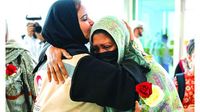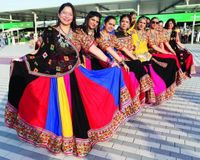Dubai - Sheikh Hamdan bin Mohammed bin Rashid Al Maktoum, the Crown Prince of Dubai, recently visited India, highlighting the deep-rooted relationships between the United Arab Emirates (UAE) and India. This visit not only signifies a political and economic partnership but also emphasizes a cultural and intellectual bridge that connects the two nations. As noted during the visit, while politics and economics lay the groundwork for international relations, it is culture that breathes life into these connections, fostering human ties that transcend mere interests.
India's presence in the Gulf region has been felt for centuries, with the UAE serving as a second home for millions of Indians who have contributed to its development. The meetings between the Emirati and Indian leadership underscore the importance of cultural strength in opening broader avenues for dialogue and collaboration.
Dr. Shehab Ghanem, a prominent Emirati poet who recently received the Tagore Peace Prize, remarked, "The historical ties between India, the Gulf, and the Arabian Peninsula are ancient, dating back to before Islam, with trade in spices and textiles being a significant part of this relationship." He further pointed out the influence of Indian culture in the UAE, noting that today, more than 200 nationalities coexist harmoniously in the Emirates, with Indians making up the largest group.
Ghanem emphasized the importance of cultural and soft power in strengthening ties and enhancing mutual understanding, which ultimately benefits both nations. He highlighted the historical trade relationships that have evolved into rich cultural exchanges, particularly in music and cinema. Indian music, for instance, has significantly influenced Gulf music, as reflected in the works of artists like Juma Khan Al-Hazrami.
Furthermore, Indian cinema has been a staple in the UAE since the early 20th century, alongside Egyptian and American films. Ghanem has translated over 100 Indian short stories, showcasing the literary connection between the two cultures. His contributions have earned him numerous accolades, including over 25 awards for his literary achievements.
Emirati poet Adel Khuzam also spoke about the deep historical dimensions of the UAE-India relationship, stating, "The relationship between us and India is deeper than imagined." He noted that this connection was solidified during the early Islamic period when Malik bin Dinar built the first mosque in Kerala, India, which still stands today. Khuzam emphasized that the cultural exchange has expanded beyond trade to include art, literature, and music, enriching both societies.
Dr. Maryam Al-Shanasi, a writer and publisher, highlighted the importance of Gulf literature in fostering cultural exchange, stating, "I have a long experience in supporting the Arabic language and Gulf literature in India." She pointed out that the interest in Gulf literature has grown in India, with many research papers being published on the subject. Al-Shanasi believes that the focus on literature is crucial for enhancing mutual understanding and cooperation.
In the academic realm, Dr. Abbas K. Bai, an Indian scholar specializing in Arabic literature, noted the increasing collaboration between Indian and Gulf universities, which has facilitated a deeper exchange of knowledge and ideas. He highlighted the importance of this cultural openness in enhancing understanding between the peoples of both nations.
Meanwhile, translator Abdo Shiouboram Kumbrail emphasized the role of translation as a vital bridge between cultures. He remarked, "The cultural relationship between India and the Arab world, particularly the UAE, is one of the most profound and influential connections we have, allowing us to discover each other through literature, film, and food." Kumbrail pointed to various initiatives, such as joint cultural festivals and student exchanges, that have strengthened this relationship.
The UAE's commitment to humanitarian efforts is also noteworthy, particularly in its response to the ongoing crisis in Sudan. Over the past ten years, the UAE has provided more than $3.5 billion in humanitarian aid to support the Sudanese people, making it one of the first countries to respond to the humanitarian crisis in the region. This commitment reflects the UAE's dedication to alleviating suffering and improving living conditions for those affected by conflict.
During the Zayed Humanitarian Work Day in March, the UAE launched a significant initiative to provide humanitarian support to refugees from Sudan and neighboring countries. This initiative included a high-profile humanitarian visit to refugee camps in South Sudan, demonstrating the UAE's commitment to addressing the humanitarian crisis and coordinating efforts to assist those in need.
In February, the UAE participated in a United Nations meeting to launch humanitarian response plans for Sudan, emphasizing the importance of international cooperation in addressing the crisis. During a high-level humanitarian conference in Addis Ababa, the UAE announced an additional $200 million in humanitarian aid, further underscoring its commitment to supporting the Sudanese people during this challenging period.
The UAE has also established a humanitarian air bridge to provide support to Sudan and neighboring countries, delivering thousands of tons of essential supplies, including food and medical aid. This effort has been crucial in alleviating the humanitarian situation in Sudan and its neighboring regions.
Overall, the deep-rooted cultural, historical, and humanitarian ties between the UAE and India continue to flourish, fostering mutual understanding and cooperation. Through literature, art, and humanitarian efforts, both nations exemplify a commitment to building bridges that transcend borders and promote shared values.






